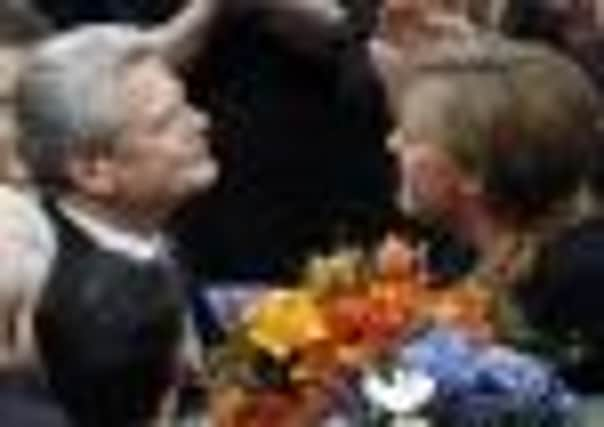A bouquet for Germany’s new president


In the largely ceremonial office of president, Mr Gauck presents no threat to Merkel’s domination of national politics, but his moral authority, independence of mind and lack of party affiliation could make him an awkward partner for her government as it struggles to overcome Europe’s economic crisis.
Mr Gauck, 72, yesterday won 991 votes in the federal assembly comprising members of parliament and regional delegates. His main rival, veteran anti-Nazi campaigner Beate Klarsfeld, received 126 votes.
Advertisement
Hide AdAdvertisement
Hide AdGermans hope Mr Gauck, a prominent player in the peaceful protests that led to the fall of the Berlin Wall in 1989, can restore dignity to the presidency, tarnished by financial scandals that felled his predecessor Christian Wulff.
“I take up this post with the endless gratitude of a person who, after a long trek through the political desert of the 20th century, has finally and unexpectedly found his home again and was able to witness in the last 20 years the joy of shaping a democratic society,” he said after taking the oath of office.
His victory was never in doubt after all the main political parties threw their weight behind his candidacy.
Mrs Merkel played down suggestions that the feisty theologian would use his office as a pulpit to harangue Germany’s politicians or that they might clash over policy issues.
“He may well disapprove of something, so might I, but we are all adults and this isn’t about methods of education but about expressing opinions, which for the most part strengthens democracy,” she told reporters after Mr Gauck’s election.
Mrs Merkel can ill afford disputes with the president as she tries to build cross-party support for tighter fiscal rules to tackle the eurozone’s two-year sovereign debt crisis that has forced Berlin to assume greater leadership in Europe.
Mrs Merkel only reluctantly accepted Mr Gauck for the top job after her liberal coalition ally, the Free Democrats, unexpectedly joined opposition parties last month in backing him.
Mr Gauck – who describes himself politically as “a left-leaning, liberal conservative” – likes to speak his mind on controversial issues, and he does so with an eloquence forged in the pulpits of East Germany.
Advertisement
Hide AdAdvertisement
Hide AdEighty per cent of Germans trust Mr Gauck, according to an opinion poll by Infratest, yet two-thirds said they thought he would be an “uncomfortable” president for the political parties.
Mr Gauck has a rich life story shaped by the Cold War. When he was 11 his father was sent to a Siberian Gulag for alleged espionage and did not return for four years.
That experience fostered an abiding aversion to totalitarianism, and he has said freedom will be the leitmotif of his presidency. After the fall of Communism and Germany’s reunification, Mr Gauck oversaw the opening up of the archives of the dreaded Stasi, the East German secret police, earning recognition for exposing their crimes.